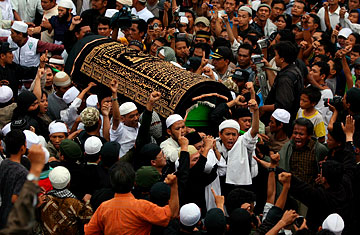
The coffin of Imam Samudra, one of the three men executed for their roles in the 2002 Bali bombings, is carried by supporters during a funeral in Serang, Banten, Indonesia, on Nov. 9, 2008
Three men involved in the 2002 bombing of two nightclubs in Bali were executed on Nov. 9 on the Indonesian prison island of Nusakambangan off the coast of Java.
Amrozi bin Hasyim, his older brother, Mukhlas, and accomplice Imam Samudra were executed by firing squad five years after being convicted for the terrorist attacks that killed 202 people, many of them tourists, on the resort island. The three Indonesians, shot just after midnight, were the first to be put to death under the country's tough anti-terrorism law, after numerous appeals for leniency were rejected by the government. (See pictures of Suharto's Indonesia.)
In the months before the execution, which had originally been planned for September, radical groups called for revenge attacks, while the American and Australian embassies in Indonesia received bomb threats. Malls and hotels stepped up security in response to the constant local and international media coverage of the impending executions. But some experts say violence is not likely to spread.
"We could see some kind of backlash in their hometowns in Java but I don't think there will be on a larger scale as people have seen the suffering and the majority of Muslims disagree with what they did," says Masdar Hilmy, a professor at the State Islamic University of Islam in Surabaya and an expert on radical Islam. "Mass organizations like the Nahdlatul Ulama and Muhammadiyah have also called on their followers to not be influenced by radical propaganda."
Despite some criticism of the government, the police, and its anti-terror division in particular, have been widely praised for preventing further attacks since 2005, when a second round of suicide bombings in Bali killed 20 people. Dozens of militants suspected of having ties to Jemaah Islamiah, the Al Qaeda-linked organization behind the Bali bombings, have been killed or detained. The hope is that Sunday's executions will discourage other would-be terrorists.
"The executions are a sign that the government is letting law enforcers do their job," says Agus Wijoyo, a researcher on security sector reform at the Centre of Strategic and International Studies. "For whatever is in the minds of those wanting to violate the law, this should act as a deterrent."
Others are concerned that the relentless media coverage of the execution — and the ideology of the militants — will only radicalize sympathizers. "The terrorists have been overexposed," adds Soeryo Winoto, a columnist in Jakarta. "What the television stations have been reporting is just free propaganda for the terrorists." Exclusive interviews with the terrorists have been aired on CNN, the BBC and other news networks, while their family members have appeared on local television for weeks.
"Waiting for this to happen has been like watching a slow-motion train wreck," says Ken Conboy, author of The Second Front: Inside Asia's Most Dangerous Terrorist Network. "They should have limited their exposure."
The three bodies were returned on Sunday to their hometowns, where they were greeted by emotional crowds and heavy security, but no major outbreaks of violence were reported. Organizations like Amnesty International and other human rights groups had opposed the executions on humanitarian grounds and out of concern that they would turn the extremists into heroes; already other militants have called the bombers "holy warriors." "The possibility of martyrdom is a highly contested idea but only the fringe groups will see their deaths as mati syahid," explains Masdar Hilmy, using the Indonesian term for martyrdom.
Many relatives of the 88 Australians killed in the bombings expressed relief and a sense of closure after the executions. Meanwhile, some Indonesian survivors are still waiting for government assistance to aid their recovery. Chusnul Khotimah, who was severely burned in the attacks, said she was "satisfied and thankful" for the bombers' deaths but asked the government for help. "I have received nothing from the government since the bombings," Khotimah told reporters. "I would like help finding a job because I have not worked since the attacks."
